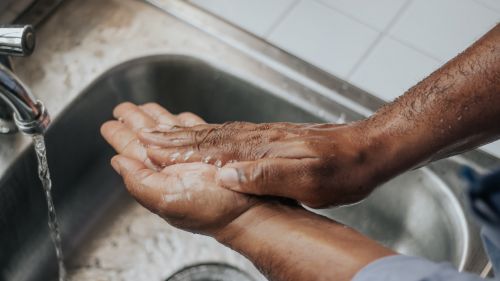When Hand Washing is a Luxury, a Pandemic's Legacy Lengthens

During a pandemic outbreak, washing our hands is integral in stopping the spread. However, in many parts of Africa and elsewhere in the developing world, properly washing hands is a luxury—as is soap.
Handwashing as a Luxury
As the coronavirus advances through Africa, a line that is nestled in the middle of my book, The First 1,000 Days, needs to be elevated to headline status: “Only 8 percent of Uganda’s population had a handwashing facility at home with readily available soap and water.”
Handwashing has been trumpeted as one of the most vital ways to stop the spread of the coronavirus. Videos of prominent people demonstrating the proper hand-washing techniques have themselves gone viral, spreading across social media and television.
Until the pandemic outbreak, washing hands was a mundane task in rich precincts of the world, a chore largely taken for granted. Soap is seen as a routine commodity. But in many parts of Africa, as well as elsewhere in the developing world, properly washing hands is a luxury, as is soap.
As is water. The same source that provided the woeful handwashing statistic—the Situation Analysis of Children in Uganda, prepared by the Ugandan government and UNICEF several years ago—reported that for nearly two-thirds of families in the country the nearest source of safe water was at least a 30-minute round-trip walk away, and more than one-third were sixty minutes away. Pregnant mothers in Uganda (and many other African countries) are advised to bring their own water and soap to the clinics when they come to deliver their babies, along with suturing materials and a clean blade to cut the umbilical cord.
A separate report from UNICEF and the World Health Organization surveying water, sanitation, and hygiene services in health care facilities in 54 low- and middle-income countries found that 38 percent of these facilities lacked access to an improved water source, 19 percent didn’t provide sanitation, and 35 percent didn’t have soap and water for handwashing.
Imagine the potential consequences if the coronavirus spreads in these countries as it has in the US and Italy and other rich-world countries.
The arrival of the virus in Africa follows the invasions of the fall armyworm and a vast swarm of locusts, which have ravaged crops and threatened the continent’s food supply. Now the virus advances as the planting season plays out in much of the continent. On the millions of small farms, planting is not a mechanized task by a lone farmer riding in the cab of a tractor. Rather, it is mainly manual labor, done in teams of smallholder farmers (the majority of them women) and their children and neighbors working side-by-side, bending deeply to burrow the seeds in the soil. How can the social distancing norms of six feet of separation apply when the seeds are planted one or two feet apart? Harvests already lessened by the pest infestations will be further diminished if the new planting is interrupted.
This will lead to a rise in malnutrition, which weakens bodies and compromises immune systems, increasing susceptibility to disease. Despite some improvement in recent years, the most recent tabulation of global malnutrition numbers in UNICEF’s 2019 State of the World’s Children report is troubling enough: 144 million stunted physically, cognitively, or both; 47 million wasted (seriously underweight); nearly half of all children under five years of age micronutrient malnourished (inadequate intake of the crucial vitamins and minerals necessary to fuel the proper growth of body and brain).
As for older children, school closures to prevent the spread of the virus mean losing access to perhaps their one sure meal of the day. The United Nations World Food Program, which operates school feeding services in dozens of countries, estimates that 12 million children—and counting—are missing out on this daily source of nourishment.
Malnourished children often become malnourished adults. It is a grim reality that will carry the legacy of the coronavirus far into the future.

